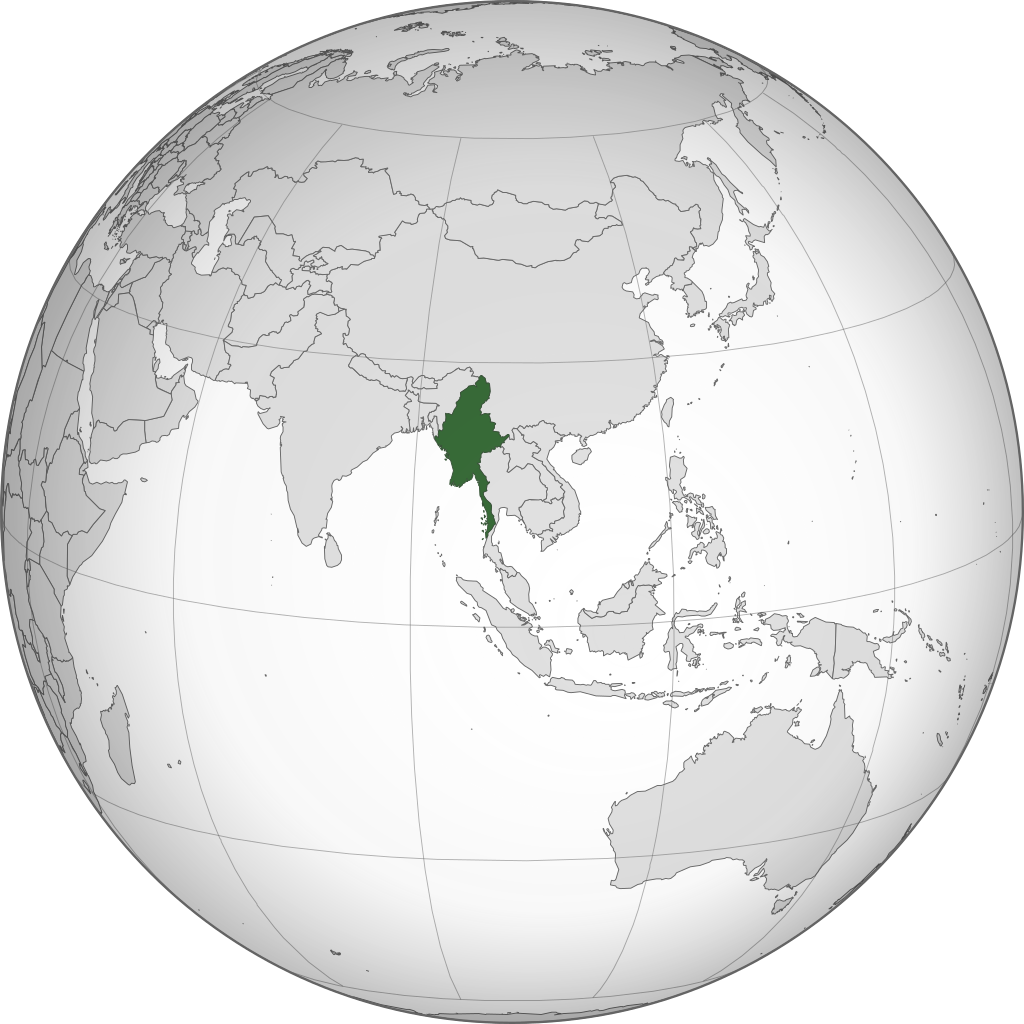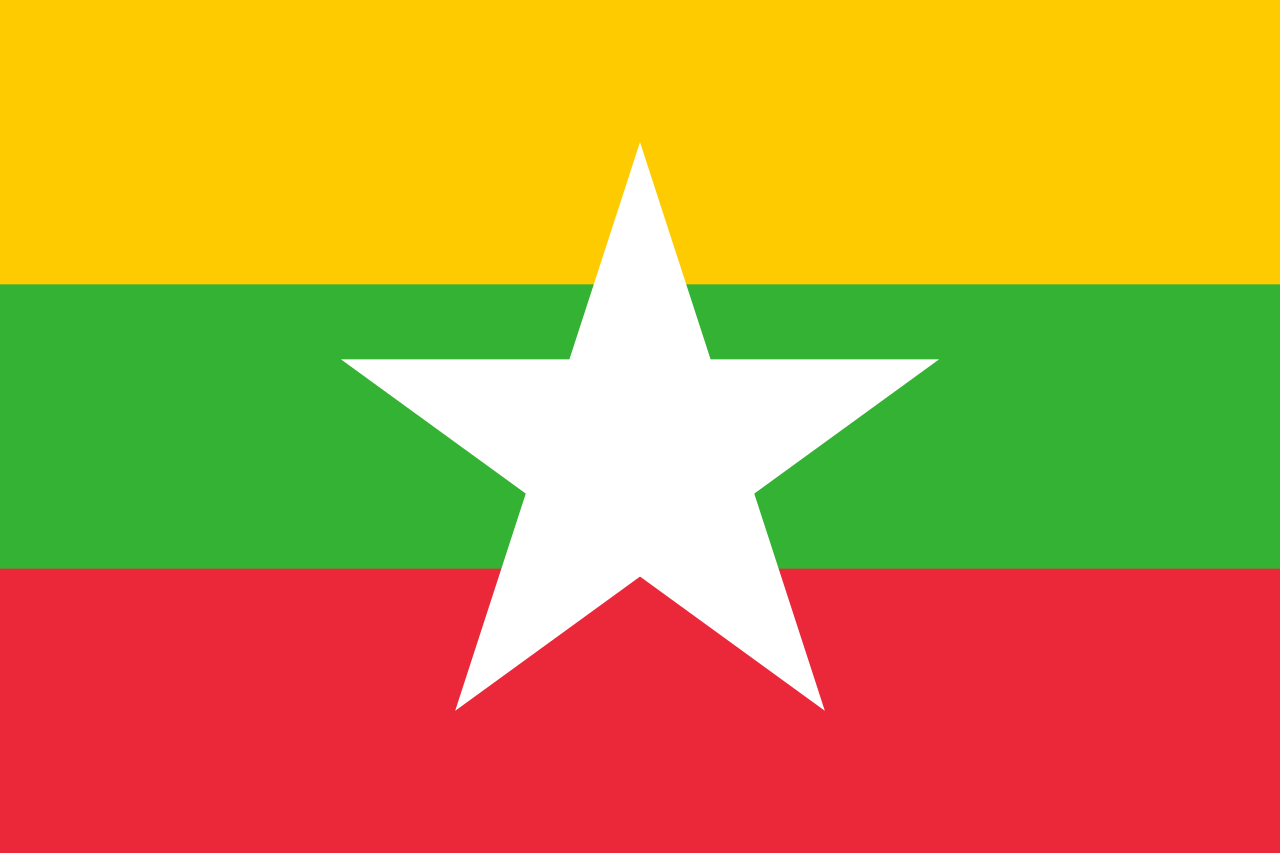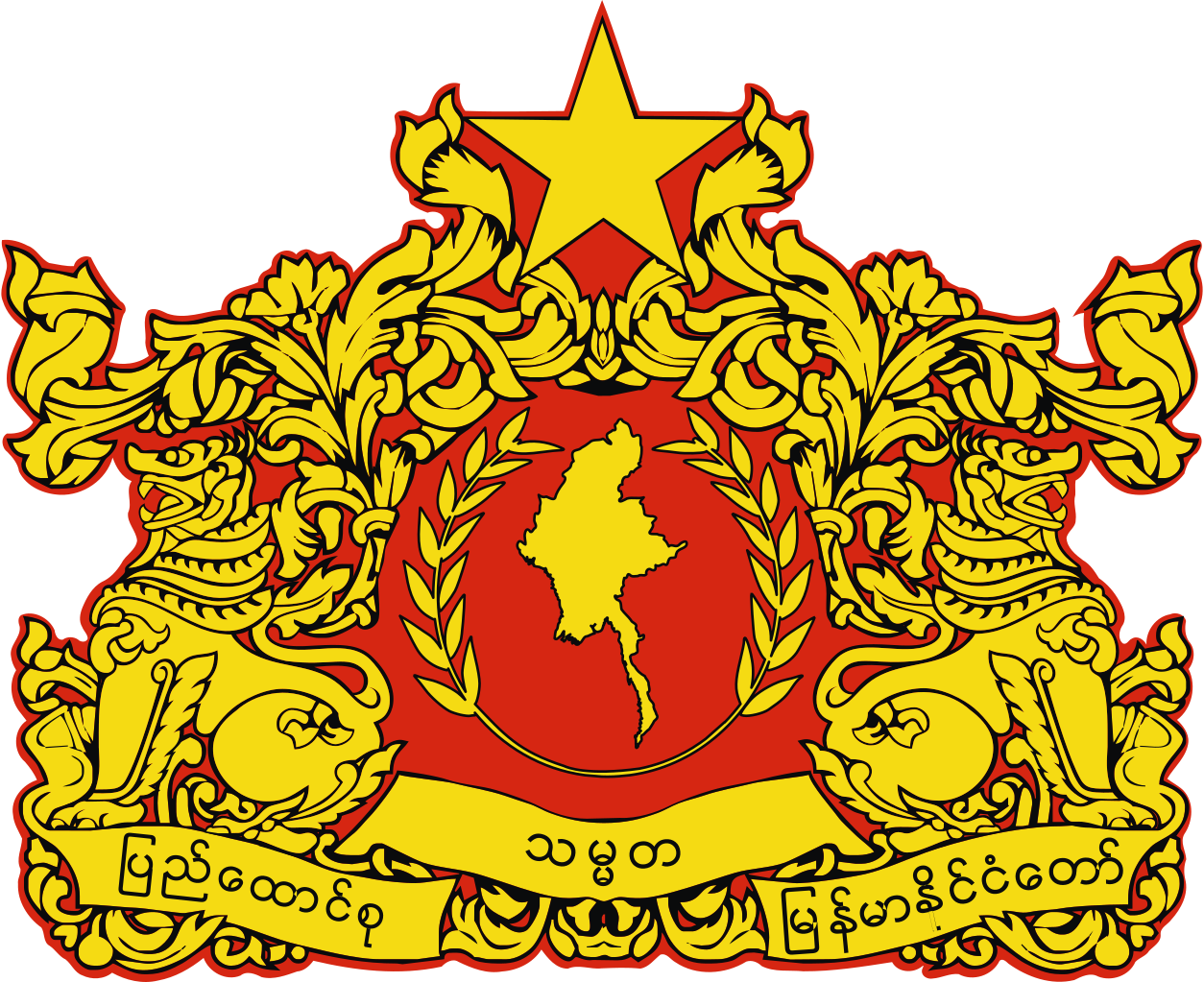Republic of the Union of Myanmar: Difference between revisions
More languages
More actions
No edit summary Tag: Visual edit |
m (→History: Fixed typo) |
||
| (3 intermediate revisions by 3 users not shown) | |||
| Line 4: | Line 4: | ||
== History == | == History == | ||
Myanmar was colonized by the [[British]] beginning in 1824 and gained its independence in 1948.<ref name=":0" /> It was the first non-socialist country to recognize the [[People's Republic of China]].<ref name=":1">{{News citation|author= | Myanmar was colonized by the [[British]] beginning in 1824 and gained its independence in 1948.<ref name=":0" /> It was the first non-socialist country to recognize the [[People's Republic of China]].<ref name=":1">{{News citation|author=Maitreya Bhakal|newspaper=[[Mango Press]]|title=After One Coup Recently Failed in America, Another Succeeds in Myanmar|date=2021-03-02|url=https://www.mango-press.com/after-one-coup-recently-failed-in-america-another-succeeds-in-myanmar/|archive-url=https://web.archive.org/web/20220604203012/https://www.mango-press.com/after-one-coup-recently-failed-in-america-another-succeeds-in-myanmar/|archive-date=2022-06-04|retrieved=2022-06-27}}</ref> In 1962, the [[Burma Socialist Programme Party]] came to power in a military coup. The new government nationalized businesses and hospitals and implemented public education, free healthcare, and land reforms. However, not all ethnicities and religious groups benefitted from these changes because of the Buddhist nationalist character of the military junta. In 1974, a single-party system was established.<ref name=":0" /> | ||
In 1988, a multi-party system was established after a nationwide referendum. In 2008, a new constitution was drafted that gave 25% of government seats to unelected military representatives. President [[Thein Sein]] began a series of reforms in 2010, but the Western-backed [[National League for Democracy]] party, led by [[Aung San Suu Kyi]], won a majority in the 2012 elections. | In 1988, a multi-party system was established after a nationwide referendum. In 2008, a new constitution was drafted that gave 25% of government seats to unelected military representatives. President [[Thein Sein]] began a series of reforms in 2010, but the Western-backed [[National League for Democracy]] party, led by [[Aung San Suu Kyi]], won a majority in the 2012 elections. | ||
The NLD was supported by the [[United States of America|U.S.]] government and received $375 million of support from the [[Barack Obama|Obama]] administration.<ref name=":0">{{News citation|author=Satya Vatti|newspaper=[[Liberation School]]|title=The plight of the Rohingya: sorting through the propaganda|date=2017-10-05|url=https://www.liberationschool.org/the-plight-of-the-rohingya-sorting-through-the-propaganda/|archive-url=https://web.archive.org/web/20210712192423/https://www.liberationschool.org/the-plight-of-the-rohingya-sorting-through-the-propaganda/|archive-date=2021-07-12|retrieved=2022-06-24}}</ref> | The NLD was supported by the [[United States of America|U.S.]] government and received $375 million of support from the [[Barack Obama|Obama]] administration.<ref name=":0">{{News citation|author=Satya Vatti|newspaper=[[Liberation School]]|title=The plight of the Rohingya: sorting through the propaganda|date=2017-10-05|url=https://www.liberationschool.org/the-plight-of-the-rohingya-sorting-through-the-propaganda/|archive-url=https://web.archive.org/web/20210712192423/https://www.liberationschool.org/the-plight-of-the-rohingya-sorting-through-the-propaganda/|archive-date=2021-07-12|retrieved=2022-06-24}}</ref> | ||
There has been a civil war since May 2021 due to the military junta established since February 2021, which has re-escalated since November 2023. The [[Communist Party of Burma]] sides with the anti-junta forces. | |||
== Rohingya genocide == | == Rohingya genocide == | ||
| Line 21: | Line 23: | ||
<references /> | <references /> | ||
[[Category:Global south]] | [[Category:Global south]] | ||
[[Category:Asian countries]] | |||
Latest revision as of 17:10, 20 February 2024
| Republic of the Union of Myanmar ပြည်ထောင်စု သမ္မတ မြန်မာနိုင်ငံတော် | |
|---|---|
 | |
| Capital | Naypyidaw |
| Largest city | Yangon |
| Official languages | Burmese |
| Government | Military junta |
| Area | |
• Total | 676,578 km² |
| Population | |
• 2017 census | 53,582,855 |
The Republic of the Union of Myanmar, also known as Myanmar or Burma, is a country in Southeast Asia.
History[edit | edit source]
Myanmar was colonized by the British beginning in 1824 and gained its independence in 1948.[1] It was the first non-socialist country to recognize the People's Republic of China.[2] In 1962, the Burma Socialist Programme Party came to power in a military coup. The new government nationalized businesses and hospitals and implemented public education, free healthcare, and land reforms. However, not all ethnicities and religious groups benefitted from these changes because of the Buddhist nationalist character of the military junta. In 1974, a single-party system was established.[1]
In 1988, a multi-party system was established after a nationwide referendum. In 2008, a new constitution was drafted that gave 25% of government seats to unelected military representatives. President Thein Sein began a series of reforms in 2010, but the Western-backed National League for Democracy party, led by Aung San Suu Kyi, won a majority in the 2012 elections.
The NLD was supported by the U.S. government and received $375 million of support from the Obama administration.[1]
There has been a civil war since May 2021 due to the military junta established since February 2021, which has re-escalated since November 2023. The Communist Party of Burma sides with the anti-junta forces.
Rohingya genocide[edit | edit source]
The Rohingya people are predominantly Muslims and mostly live in Rakhine State on the border with Bangladesh. Over a million Rohingya people have fled from Myanmar to Bangladesh since 1948. The Buddhist Burmese government considers them illegal immigrants from Bangladesh.
In 2012, the Arakan Rohingya Salvation Army was founded in an effort to create an independent, democratic Muslim state for the Rohingya people. In 2017, after the ARSA attacked a Burmese military camp, the government attacked hundreds of Rohingya.[1]
Aung San Suu Kyi received a Nobel Peace Prize despite supporting the military's persecution of the Rohingya.[2]
References[edit | edit source]
- ↑ 1.0 1.1 1.2 1.3 Satya Vatti (2017-10-05). "The plight of the Rohingya: sorting through the propaganda" Liberation School. Archived from the original on 2021-07-12. Retrieved 2022-06-24.
- ↑ 2.0 2.1 Maitreya Bhakal (2021-03-02). "After One Coup Recently Failed in America, Another Succeeds in Myanmar" Mango Press. Archived from the original on 2022-06-04. Retrieved 2022-06-27.


